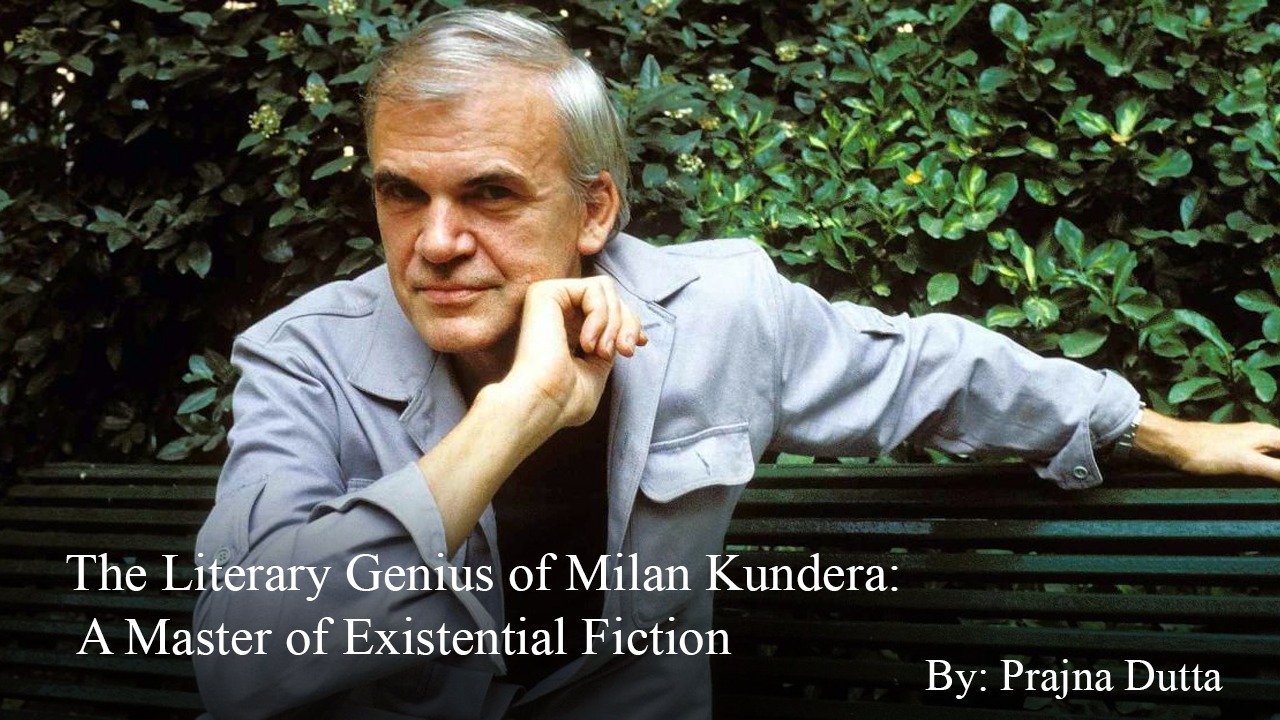Introduction:
Milan Kundera, a prominent Czech-born French writer, stands as one of the most influential and celebrated literary figures of the 20th century. Renowned for his thought-provoking narratives, profound philosophical insights, and exploration of human nature, Kundera has left an indelible mark on the world of literature. This article delves into the life, works, and enduring legacy of Milan Kundera, a true master of existential fiction.
Early Life and Influences:
Born on April 1, 1929, in Brno, Czechoslovakia, Milan Kundera grew up in a culturally rich environment. He was deeply influenced by the turbulent political climate of his time, particularly the events leading up to and following the Communist takeover of Czechoslovakia in 1948. Kundera's experiences with totalitarian regimes profoundly shaped his worldview, leading him to explore themes of individual freedom, the nature of power, and the complexities of human relationships in his writings.
Literary Style and Themes:
Kundera's unique literary style is characterized by his ability to seamlessly blend elements of philosophy, psychology, and political critique within his narratives. His works often challenge conventional storytelling techniques, employing non-linear structures, multiple perspectives, and intricate symbolism to offer a multi-faceted exploration of his themes.
One of the recurring themes in Kundera's works is the nature of human existence and the quest for personal identity. He delves into the complexities of the human condition, examining the tension between individual desires and societal expectations. Kundera's characters often grapple with existential questions, seeking meaning and freedom in a world marked by uncertainty and absurdity.
Love and sexuality also play a central role in Kundera's works. His exploration of intimate relationships, desire, and the power dynamics between individuals unveils the intricate complexities of human connections. Kundera's characters are vividly human, flawed, and driven by their passions, allowing readers to empathize with their struggles and vulnerabilities.
Major Works:
Milan Kundera's literary oeuvre comprises numerous critically acclaimed works, including "The Joke" (1967), his debut novel that centers around the protagonist's political persecution under the Communist regime. "The Book of Laughter and Forgetting" (1979) explores themes of memory, history, and political repression. However, it was with his masterpiece, "The Unbearable Lightness of Being" (1984), that Kundera gained international recognition. This novel, set against the backdrop of the Prague Spring of 1968, delves into the complexities of human relationships and the inherent lightness and weightiness of existence.
Kundera's later works include "Immortality" (1990), "Slowness" (1995), and "Identity" (1997), where he continues to explore his signature themes with his characteristic blend of philosophical depth and narrative elegance. Each of these works offers a profound and introspective examination of the human condition, inviting readers to question their own existence and the nature of their relationships.
Legacy and Impact:
Milan Kundera's literary contributions have had a profound impact on the literary world. His works have been translated into numerous languages, allowing readers from around the globe to engage with his profound insights into the human experience. Kundera's ability to blend philosophy, politics, and storytelling continues to inspire and influence writers and intellectuals worldwide.
Kundera's writing style, marked by its intellectual depth, lyrical prose, and intricate narrative structures, has garnered him a dedicated following of readers who appreciate his ability to explore complex themes with nuance and sophistication. His works have been praised for their philosophical musings, psychological depth, and profound understanding of human nature.
Furthermore, Milan Kundera's impact extends beyond the realm of literature. His writings have sparked discussions on political and societal issues, particularly in relation to the oppressive regimes he experienced firsthand. Kundera's critiques of totalitarianism and his reflections on the nature of power have resonated with readers who have faced similar challenges in their own lives and societies.
Moreover, Kundera's exploration of love, sexuality, and intimacy has contributed to broader conversations about relationships and the complexities of human emotions. By portraying characters who grapple with desire, jealousy, and the pursuit of personal freedom, Kundera invites readers to reflect on their own experiences and consider the intricacies of human connections.
Milan Kundera's literary legacy also lies in his ability to bridge the gap between Eastern and Western literature. As a Czech-born author who later became a French citizen, Kundera's works embody a fusion of Eastern European and Western literary traditions. This cross-cultural perspective has allowed his writings to transcend national boundaries and resonate with readers from diverse backgrounds.
In recognition of his immense contributions to literature, Milan Kundera has received numerous prestigious awards, including the Jerusalem Prize for the Freedom of the Individual in Society, the Herder Prize, and the Franz Kafka Prize. These accolades highlight the lasting impact of his works and their enduring relevance in the literary canon.
Conclusion:
Milan Kundera's unparalleled ability to blend philosophy, politics, and storytelling has solidified his position as an esteemed literary figure. His exploration of existential themes, nuanced character portrayals, and profound insights into the human condition have captivated readers and influenced writers around the world. Kundera's works continue to resonate with audiences, encouraging introspection, questioning societal norms, and offering a deeper understanding of the complexities of existence. As we reflect on his contributions, it becomes evident that Milan Kundera's legacy as a master of existential fiction is destined to endure for generations to come.

Comments